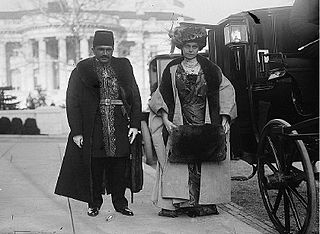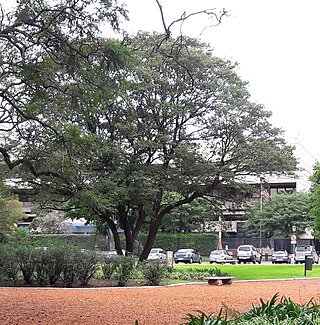
A chargé d'affaires, plural chargés d'affaires, often shortened to chargé (French) and sometimes in colloquial English to charge-D, is a diplomat who serves as an embassy's chief of mission in the absence of the ambassador. The term is French for "charged with business", meaning they are responsible for the duties of an ambassador. Chargé is masculine in gender; the feminine form is chargée d'affaires.

John Appleton was an American lawyer, politician and diplomat who served as the United States' first chargé d'affaires to Bolivia, and later as special envoy to Great Britain and Russia. Born in Beverly, Massachusetts, Appleton graduated from Bowdoin College in 1834 and attended Harvard Law School from 1835 to 1836. On leaving Harvard, he became a barrister and newspaper editor while maintaining a vigorous involvement in Democratic politics. In 1840 he was appointed as registrar of probates for Cumberland County, Maine, and in 1845 became Chief Clerk for the United States Department of the Navy.

Bolivia–United States relations were established in 1837 with the first ambassadorial visit from the United States to Peru–Bolivian Confederation. The Confederation dissolved in 1839, and bilateral relations did not occur until 1848 when the United States recognized Bolivia as a sovereign state and appointed John Appleton as the Chargé d'Affaires.
Douglas Henderson was an American diplomat and government official. He served as United States Ambassador to Bolivia during the 1964 Bolivian coup d'état and Che Guevara's ill-fated 1966-1967 insurgency.

This is a summary history of diplomatic relations of the United States listed by country. The history of diplomatic relations of the United States began with the appointment of Benjamin Franklin as U.S. Minister to France in 1778, even before the U.S. had won its independence from Great Britain in 1783.

Bolivia–Mexico relations are the diplomatic relations between the Plurinational State of Bolivia and the United Mexican States. Both nations are members of the Community of Latin American and Caribbean States, Latin American Integration Association, Organization of American States, Organization of Ibero-American States and the United Nations. There is a community of approximately 10,000 Mexican citizens residing in Bolivia.

Bolivia–Spain relations are the current and historical relations between Bolivia and Spain. Both nations are members of the Association of Spanish Language Academies, Organization of Ibero-American States and the United Nations.
The mission of the United States Embassy in Nicaragua is to advance the interests of the United States, and to serve and protect U.S. citizens in Nicaragua. As of 2019, Ambassador of the United States to Nicaragua is Kevin K. Sullivan, who was appointed by President Donald Trump and confirmed by the Senate on October 11, 2018.

Krishna Raj Urs is an American diplomat who served as the United States Ambassador to Peru from 2017 to 2020.

The Embassy of the United States in Lisbon is the embassy of the United States in Portugal, in the capital city of Lisbon. It is located on Avenida das Forças Armadas.

Todd D. Robinson is an American diplomat who has served as Assistant Secretary of State for International Narcotics and Law Enforcement Affairs since September 2021. He previously served as the charge d'affaires of the U.S. embassy in Venezuela from December 2017 until being expelled in May 2018, and the U.S. ambassador to Guatemala from 2014 to 2017.

Bolivia–Germany relations are the diplomatic relations between the Plurinational State of Bolivia and the Federal Republic of Germany. Both nations are members of the United Nations.

The Embassy of the United States in Helsinki is the diplomatic mission of the United States to Finland.

The Embassy of the United States in Buenos Aires is the diplomatic mission of the United States in Argentina. It is within walking distance of Bosch Palace, which is the residence of the United States Ambassador to Argentina.












